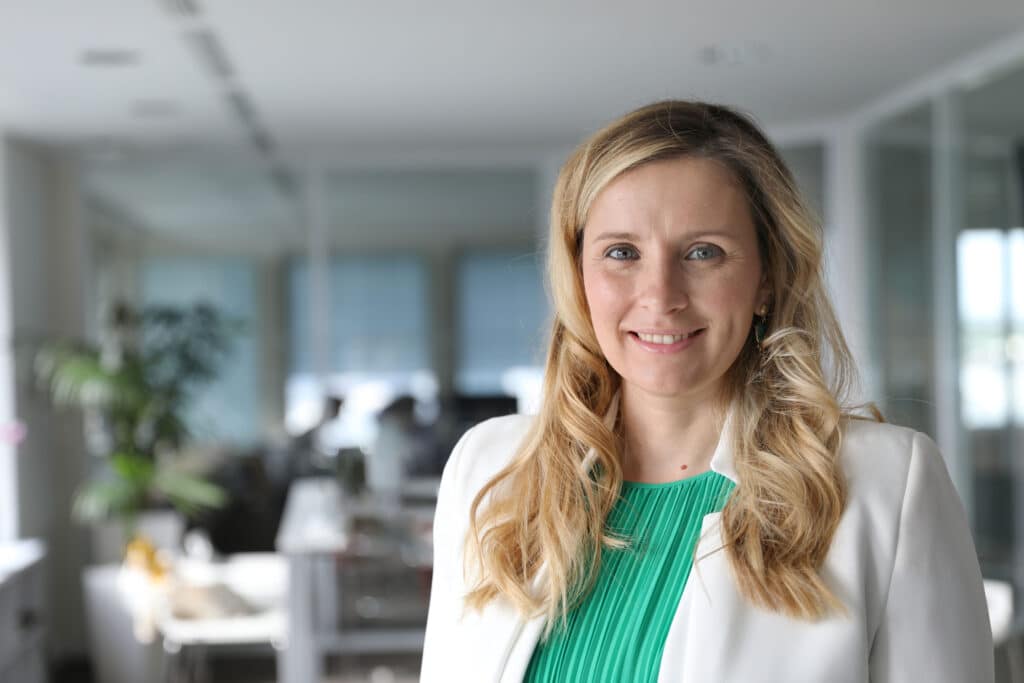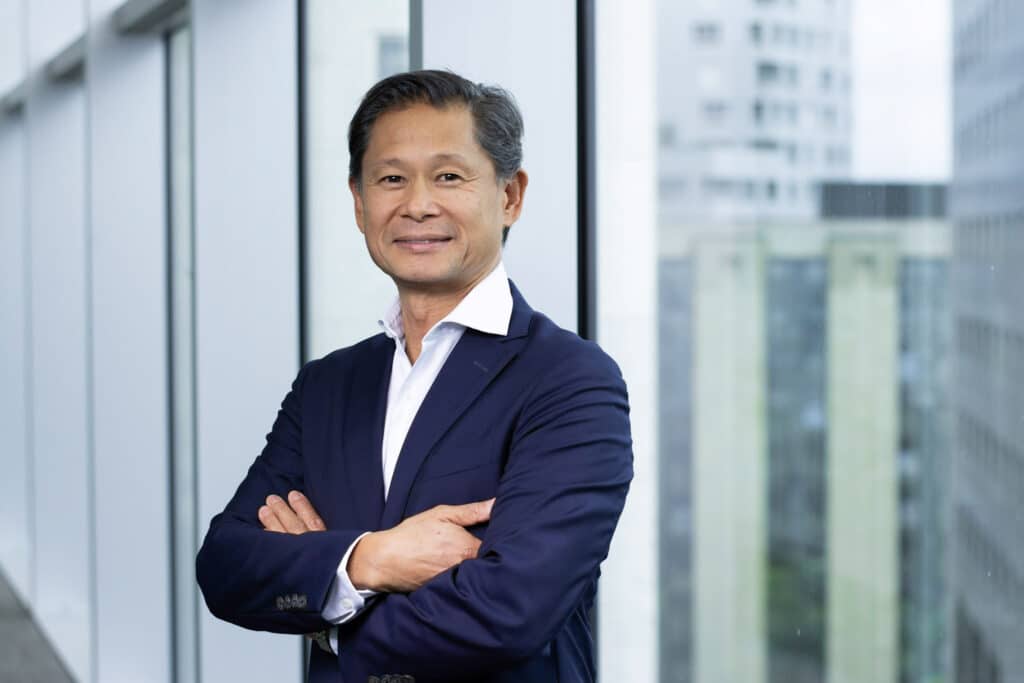Société Générale (SG) is embarking on its 2021 Global Markets Incubator programme, which offers fintechs access to experts within its Corporate & Investment Banking divisions to support the development of new solutions that address existing banking challenges or improve customer experience. Just four years after its launch, the incubator program boasts successful alumni technologies such as WeMatch and Opensee (formerly ICA). In a Q&A with DerivSource, Claire Calmejane, Chief Innovation Officer, and Albert Loo, Global Deputy Head of Sales for Global Markets, share the focus for this year’s programme and how this fits in with the bank’s new five-year digital transformation and innovation plan.
Q. SG recently opened the 2021 intake for applications to your pioneering Global Markets Incubator programme. How has the focus for the programme changed since inception back in 2018?
A. (Albert Loo (AL), Deputy Global Head of Sales, Global Markets)
We have been consistent in our selection criteria for the Global Market Incubator since we started the programme in 2018. Naturally it is dictated by the number and quality of the applications we receive to join the programme. Last year we received more than 100 applications.
We choose companies like Opensee and WeMatch with specialist expertise in selected areas where it is either more relevant or more efficient to go with external partners. SG has a proud history of engineering prowess going back to our foundation in the first Industrial Revolution – it’s part of our DNA, – so the chosen fintechs must add value by bringing something new. The selection process is not just by a team of senior executives, it is also determined by the appetite of our 2,000 colleagues to join the SG team dedicated to work with the chosen fintech for six months. If no-one wants to be part of the incubator team for a certain fintech, even the most appealing one, we don’t proceed.
Q. What are the themes you plan to focus on next in the 2021 Global Markets Incubator programme?
A. (Claire Calmejane (CC), Chief Innovation Officer)
One of this year’s important themes is to recruit fintechs which allow us to improve operational efficiency and productivity, a priority in SG’s digital transformation and innovation strategy for 2021-2025.
In terms of digital assets, we formed SG Forge under our own intrapreneurship programme. Forge provides the tools to issue and manage regulated digital-native financial products registered on public blockchain. In mid-April Forge issued the first structured product as a security token registered on the Tezos blockchain. This followed two covered bonds issues managed by Forge, the first using the Ethereum blockchain for settlement in euros and the second which settled in the Central Bank Digital Currency (CBDC) issued by the Bank of France. It’s an important step because it shows clients the future and many of them are looking at this space. In five years, tokenization will probably be completely mainstream in business language, yet a small part of volumes.
Cybersecurity is vital as a result of mass digitalisation of banking services. It’s an in-house function and we committed €650 million during the past three years to protect our infrastructure and sensitive applications, strengthen the security of client data and the options we offer to customers, and in enhancing our detection and response capabilities.
Q. How does the new programme fit with the SG 5-year digital transformation and innovation plan and for the wholesale banking division specifically? What are the high-level goals and key deliverables you aim to achieve?
A. (CC) The multi-year plan is ambitious because it is about widespread practical application of the technologies at the core of the bank to drive value creation and delivering positive outcomes. It’s about scaling up to an industrial level. We have 80 data and AI use cases in place and the task now is to ensure they help manage workflow and other central operations across the bank. I mentioned earlier that one of the key priorities in the digital transformation and innovation strategy is about delivering excellence in our operational performance, so the Global Markets Incubator programme fits very much with this.
Elsewhere, the 2021-2025 plan has two other priorities: delivering value to clients through the quality, greater personalisation and relevance of our products and services, which will differentiate us from other banks. SG is also seeking to innovate as a leader in sustainable banking, particularly since ESG criteria are becoming increasingly important in business and investment decisions.
In terms of the wholesale bank’s digital transformation, we can learn a lot from the successes in the retail bank, where we have more than a 60% penetration rate for digital activities. Across the industry, the wholesale bank’s digital transformation is following the retail arm in terms of maturity but Covid-19 has accelerated the take-up and digitalisation of services across financing, capital markets and global payments and transaction services that we offer to business customers.
Q. How might your digital transformation / innovation plan will set you apart from other banking groups? Other banks are doing the same incubator programmes where does collaboration fit and how is it done?
A. (AL) All banks are on a digital journey in face of the challenges that fintechs, digital payment providers and Big Technology companies pose to their services, mainly in the field of retail banking. There aren’t any other bank fintech incubator programmes dedicated to global markets, though. Other groups have entrepreneurs in residence programmes, so ours is unique in this respect. We started the Global Markets Incubator programme in 2018 and this year will be its fourth iteration.
If you look at the substantial funding flows into fintechs, only about 4% is going to global markets-focused businesses and, of that amount, about 80% is for fintechs that are enabling banks rather than directly competing with them. It’s a different dynamic in wholesale banking because of the higher barriers to entry caused by regulation and the related costs.
Once we have onboarded a fintech, we share our data , our expertise, our network and present them to our clients. They work alongside our sales and trading experts, receive compliance and risk advice from our in-house experts and they are connected to our entire innovation ecosystem. The final phase of the programme is when we decide whether to move onto a commercial contract. Here we concentrate on whether it will improve our bottom line and productivity and/or if it would enhance our relationship through the provision of innovative products.
Q. How do you think fintechs or innovative technology can help SG’s B2B banking division operations and offering? Will you look to harness solutions to increase scale, improve customer experience or reduce emerging risks?
A. (CC) Harnessing solutions developed in partnership with fintechs achieves all of the objectives you mention. At SG we approach things either by building it ourselves – as we did with Forge to develop innovative products for clients using public blockchain – or by partnering with those that can deliver a solution. By being open-minded, embracing change and recognising the value that fintechs can bring, we can be bigger and better as a bank.
In our Global Markets Incubator, we tested the technology, and then decided to proceed to scale up and apply the technologies developed by Nephelai. Its software alerts us to booking errors and proposes the right input, which is extremely valuable in saving us time and money. We’ve adopted it in the equity and lending space and rolled it out across Europe, Asia and the US.
SG is also prepared to acquire technology and know-how. It was the first French bank to make a fintech acquisition in 2015, when it purchased online personal finance management specialist Fiducéo. I oversee SG Ventures which invests about €200 million in a portfolio of 30 start-ups. In B2B banking we acquired Shine last year, which is a neobank for entrepreneurs through which we can broaden the range of services that it offers. Similarly, Treezor, a Banking as a Service provider we acquired in 2018, will allow us to provide a whole suite of banking services and position it as the fintech of fintechs in Europe.
Q. What are the next steps for the SG Global Markets Incubator?
A. (AL) Applications for the Global Markets Incubator close on May 10 and those companies chosen will be invited to pitch on June 18, with successful candidates entering the programme 10 days later. We are very much looking forward to reviewing the submissions and welcome the strong interest the programme has received to date.
About the contributors:
Claire Calmejane

An IT engineer with a degree from EPITA and a HEC Master degree, Claire Calmejane began her career in 2006 in the Technology Transformation department of Capgemini Consulting, where she supported companies and especially financial institutions in their technological and digital transformation. Contributing to a study on the digital transformation of large companies led by MIT in 2011, she joined the London office of Capgemini to lead the digital center of the Financial Services sector. Recruited in 2012 by Lloyds Banking Group, as Head of Digital Delivery in the Online Services Department, she was appointed Innovation Director and set up the Innovation Labs and the Digital Academy. She was until now Risk Transformation Director at Lloyds Banking Group.
Claire Calmejane is one of the leading figures of diversity in tech in Europe. She has received several awards (Fintech 35 under 35 in 2018, Digital Leader in 2017) and regularly gives lectures on the fintech ecosystem and digital transformation at MIT, CFTE, Oxford and HEC. She is also a member of the World Economic Forum’s “Future of AI and Financial Services Automation” project and support charity in their digital strategy as well as training digital champions to enable all citizens to realize their potential online.
Albert Loo

Albert Loo began his career in 1991 at Societe Generale Corporate & Investment Banking as part of the IT team in charge of asset management accounting project. He was appointed Head of Middle Office for Interest Rate Derivatives in 1994 and took charge of the Front Office Risk Management of Europe & Asia in 1996. In 1999, he joined the interest rate derivatives sales team responsible for French corporates and in 2001, he oversaw the French sales team for corporates & local authorities. In January 2006 Albert was appointed Deputy-Head of European Sales in Interest Rate Derivatives. In 2007, he became Global Deputy-Head of Interest Rate & Foreign Exchange Derivatives then Global co-Head of Interest Rate and Forex Derivatives Sales for Issuers in 2008. He was named Co-Global Head of Sales for Fixed Income & Currencies in April 2012.
Albert was appointed Deputy Head of Sales for Global Markets in January 2018. He was formerly Global Head of Sales for Fixed Income & Currencies and Co-Head of Cross Asset Sales since 2015.
Albert has a PhD in Thermodynamics from Paris 7 University, graduated from ENSIA Engineer School (AgroParisTech) and holds a Master’s degree in Financial Markets from ITM.

